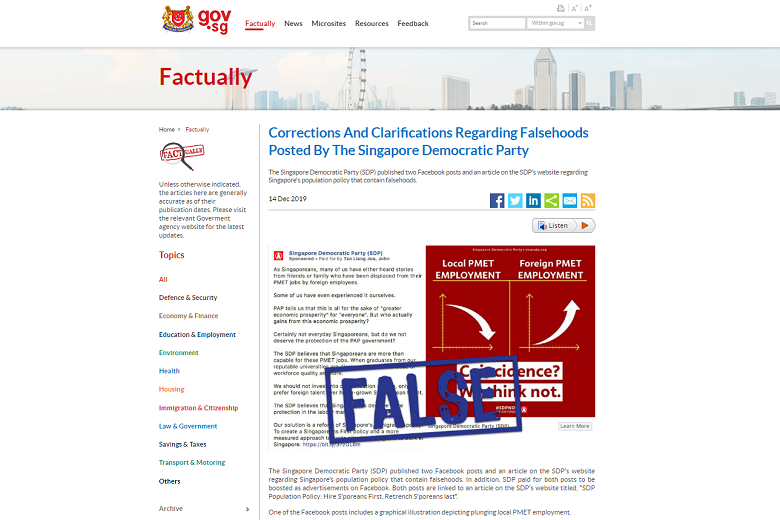Fake news law: SDP told to put up correction alongside two posts and online article on PMET employment
Sign up now: Get ST's newsletters delivered to your inbox

Minister for Manpower Josephine Teo ordered, under the Protection from Online Falsehoods and Manipulation Act, the addition of a correction note to SDP's Facebook posts and an article on its website.
PHOTO: GOV.SG
SINGAPORE - The Singapore Democratic Party (SDP) was asked on Saturday (Dec 14) to correct two of its Facebook posts and an online article that claimed local PMET employment has plunged, in the third use of the law against fake news in recent weeks.
The Ministry of Manpower (MOM), which initiated the corrections, said employment of local professionals, managers, executives, and technicians (PMETs) has in fact increased since 2015.
Criticising the motive behind the online posts and article on Singapore's population policy, the MOM said: "These false and misleading statements by the SDP have a singular objective - to stoke fear and anxiety among local PMETs."
"It is important to set the facts straight so that Singaporeans are not misled," it added.
It also noted that the SDP had paid for both posts to be boosted as advertisements on Facebook. Both posts were linked to the article.
The party had recently criticised Google over its decision to stop accepting political ads in Singapore, saying that it relies heavily on social media to reach out to voters.
The Straits Times has contacted the SDP for comments.
The use of the Protection from Online Falsehoods and Manipulation Act (Pofma) was announced by the Pofma Office.
It said it had issued three correction directions to the SDP under the instruction of Minister for Manpower Josephine Teo.
This means the opposition party will have to put up corrections alongside the posts and article and link to the facts provided by MOM on the Government's fact-checking website Factually.
Among the false statements by the SDP was a graphical illustration wrongly showing that local PMET employment had gone down, said the MOM.
Citing the Comprehensive Labour Force Survey, MOM said the number of local PMETs employed has increased from 1.17 million in 2015 to 1.3 million in 2019.
Another of the falsehoods was in an article on the SDP's website titled, "SDP Population Policy: Hire S'poreans First, Retrench S'poreans last".
The MOM said the article contained a wrong statement claiming that "the SDP's proposal comes amidst a rising proportion of Singaporean PMETs getting retrenched".
Contrary to this, added the MOM, there has been no rising trend of local PMET retrenchment since 2015.
It added that the number of retrenched local PMETs has declined from 6,460 in 2015 to 5,360 in 2018, the lowest since 2014.
MOM also said that local PMETs retrenched, as a proportion of all local PMET employees, has also declined since 2015.
Acknowledging the uncertain economic climate, MOM said: "It is understandable that some Singaporeans feel anxious about employment prospects and retrenchments."
But despite the economic headwinds, the economy is still creating jobs, it added.
"Local PMET employment has increased consistently. There is no rising trend of retrenchment, whether amongst PMETs or otherwise," said MOM.
Given people's worries, "this makes it all the more critical that public debate on the important issue of jobs is based on accurate facts, and not distortions or falsehoods", added the ministry.
"Pofma has been used to place the facts alongside the falsehoods," said the MOM.
Pofma was invoked for the first time on Nov 25, when Progress Singapore Party member Brad Bowyer became the first person to get a correction direction over a Facebook post about investments by GIC, Temasek and other government-linked companies.
He complied on the same day.
In the other incident, the owner of the States Times Review Facebook page did not comply and Facebook was issued a direction to put up a correction on his post. Facebook complied.
In all three uses of Pofma, the recipients of the correction directions were not required to take down their posts or make edits to their content.
The directions also do not impose criminal sanction, said the Pofma office.
Those who do not agree with a minister's decision can challenge it in court.
An appeal can be heard in the High Court as early as nine days after a challenge is first brought to the minister. Such a challenge could cost about $200.
A correction direction is among the remedies available under the law, designed to give the Government the tools to deal with falsehoods on the Internet.
Under Pofma, websites, social media platforms and individual users can also be asked to take down the false information completely.
In serious cases, people who are found to have spread falsehoods intentionally to destabilise society can be charged.
- Additional reporting by Clement Yong


